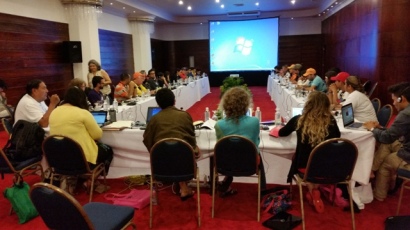
Tom BK Goldtooth, GGJ delegate, and Executive Director of the Indigenous Environmental Network was a presenter on the thematic topic on Item III. Social Participation in Decision Making. This was part of the Mesa process on the second day of the historical International Preparatory Meeting for the Social PreCOP on Climate Change, Isle of Margarita, Venezuela. The description of this thematic topic was: Adequate and effective participation of social movements in the decision making process to face the climate crisis. The guidelines for the discussion was to discuss the question of effective participation of grassroots organizations, local communities, children and youth, indigenous groups and minorities in decision making to face the climate crisis. Guidelines included: Different forms of social organization, its characteristics and effective forms of participation; Specialized language as an element of exclusion; Gender, cultural and ethnic diversity and equity; Local, national and global participation; and Recognizing traditional knowledge, experience and wisdom. Tom focused on the topic of Indigenous Peoples and did a 10-minute intervention that started out the process for discussion.
These were the talking points that Tom covered:
- Indigenous Peoples, from the North and global South have a political, legal and cultural-spiritual relationship within the countries they come from. It is not just social.
- Indigenous are not mere stakeholders, but rights-holders, because they are the original-First Peoples in the countries they come from. Indigenous populations are composed of the existing descendants of the peoples who originally inhabited the territory of a country before the arrival of colonizers from other parts of the world, either by conquest, settlement or other means.
- Politically, within climate policy initiatives, Indigenous peoples’ consistently reaffirm their rights to self-determination and to own, control and manage their ancestral lands and territories, waters and other resources.
- Indigenous peoples have the right to meaningful participation in decision-making matters which would affect their rights, through representatives chosen by themselves in accordance with their own procedures, as well as to maintain and develop their own indigenous decision-making processes and institutions.
- Indigenous peoples have a distinct spiritual and material relationship with their lands and territories. The link to their lands and territories are inextricably linked to their survival and to the preservation and further development of their indigenous knowledge systems and cultures, conservation and sustainable use of biodiversity, and ecosystem management.
- In order to participate in climate discussions, Indigenous peoples need popular education and training on the topic of climate change and global warming, including the pros and cons of mitigation and adaptation mechanisms. This especially applies to those living in far remote and rural locations. This education and training includes the crosscutting issues, solutions and risks, such as violations of treaty agreements by the U.S. and Canada; violations to the access and right to water; human rights instruments; just transition; etc;
- These popular education materials need to be available in the Indigenous Peoples’ language;
- The need to de-mystify the negotiating language of climate change within the UN climate meetings.
- Apply the provisions of the United Nations Declaration on the Rights of Indigenous Peoples, especially related to the standards and principles of Free, Prior and Informed Consent (FPIC). Indigenous peoples’ need to be fully informed on all aspects of climate change as a condition for decision making.
- Financial mechanisms need to be increased for Indigenous participation in national, regional and international meetings, seminars, workshops and conventions on climate change and its crosscutting issues.
Submitted by Tom BK Goldtooth, IEN and GGJ delegate
